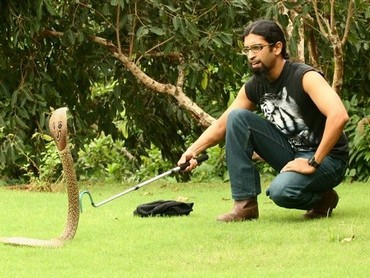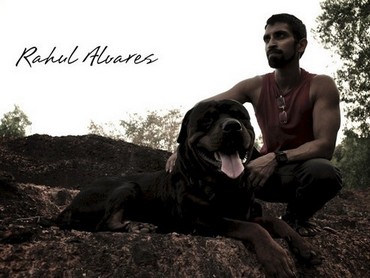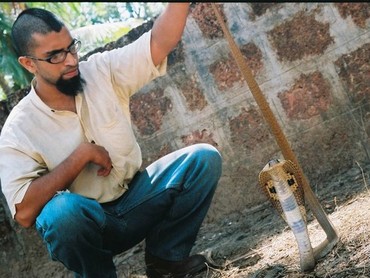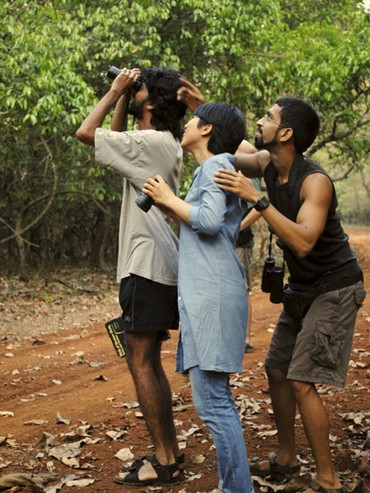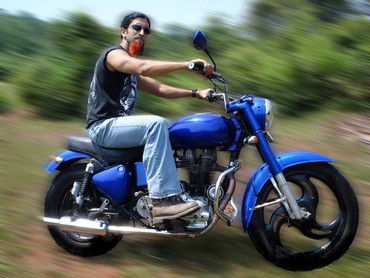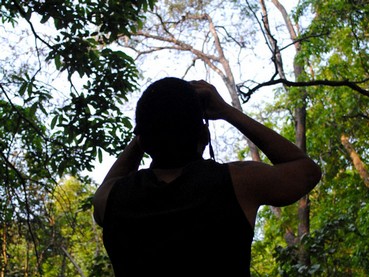 | « Back to article | Print this article |
He took a break from school to study snakes
Long before he started working, Rahul Alvares knew he wasn't cut out for a corporate job. So at 15, after he finished tenth grade, he took a year off from studying and travelled all over the country learning about snakes, earthworms, spiders, fish and other reptiles.
It was perhaps the most obvious career choice for the son of two conservationists and social workers -- Norma and Claude.
Norma, a recipient of the Padmashree award, was responsible for banning bullfights and dog shooting in Goa. A member of the Animal Welfare Board, Norma also happens to be a lawyer who only takes up public interest litigations. Claude, a former journalist, started the Goa Foundation, a prominent environmental action group, and has been at the forefront of all eco-related issues.
So when Rahul took to wildlife, they suggested he take a year off, explore his interests and make a studied decision. Eventually, they would also publish his two books -- Free from Education and The Call of the Snake.
In a country where unusual career choices are often looked at with a raised eyebrow it has been a fairly rough ride for Alvares.
Based in Goa, Alvares says since he's created this job for himself, he also has to pave the way forward -- innovating, learning and evolving with time. His website describes him as a 'wildlife consultant'. But over the years, Alvares has used his knowledge and entrepreneurial spirit to discover new avenues.
The 30 year old, who started his rather interesting career as a snake catcher, now takes groups of tourists through the forests of Goa on wildlife excursions, maintains a newsletter and is on the verge of taking his interest to a new level.
Here Rahul Alvares tells Abhishek Mande just what a wildlife consultant does and shares his rather curious career path.
Click NEXT to read his story...
'I learnt more outside the classroom'
Wildlife, especially snakes, has always fascinated me. So it was obvious that I would take up a career in wildlife. Though for the longest time I wasn't sure just what I'd be doing in the field. After I finished my tenth, dad made me an offer. He said he'd let me take an entire year off during which I could travel wherever I wanted to and learn about snakes. At 15, I packed my bags and went in search of people who could teach me all about snake catching. I went to the Pune snake park (Rajiv Gandhi Zoological Park at Katraj) , Madras Crocodile Bank and Wildlife Institute of India in Dehradun among other places.
During this time I learnt about earthworms, cobras, all kinds of snakes and wildlife. In fact I learnt to catch a cobra in Madras Crocodile Bank. It was very funny because the person who was teaching me was a caretaker there and could not speak a word of English. I learnt to catch snakes only through sign language!
The deal was that I'd help him finish his work soon and he'd teach me ways to catch snakes. This fellow was no ordinary chap. He was one of those people who go into the heart of the forests and catch snakes for making anti-venom.
For the year that I was on a break, my father insisted that I maintain a diary. If for a day I sat home and watched television, I had to write it down. The idea was that I shouldn't waste the year. And sure enough it wasn't wasted. I travelled all over the country, met people, got conned, lost money and learnt much... not just about wild animals but also about life and people.
That diary was later made into a book called Free from School. It is a story of everything I did during the year that I was on a break.
I came back to finish my graduation. Like most other kids, I hated attending lectures. I graduated in chemistry and zoology. And even though I was very sure I'd make it without having to attend lectures, the minimum attendance clause kept me nailed to the desk.
By this time I was already catching snakes and had a lot of experiences to write about. My second book, The Call of the Snake was written during my chemistry lectures!
After my graduation, I took another break and visited Thailand to learn how to catch king cobras. I returned and it was time to choose my career. My parents, especially my mother, were worried. They suggested I could try a postgraduation course. There was an option of doing something at the University of Goa. But it required me to be in college for over nine hours. So that was out of the question. Finally, I decided to go with a postgrad course in ecology and environmental science from the Sikkim Manipal University through correspondence.
Even though I scored a first class, I realised that the course was terribly outdated and the texts were filled with typos. I actually marked the changes and sent the texts back to them! By now I was done with formal education. Looking back, I know that I had learnt more when I was outside the classroom.
'Snake rescuing became a career but it was just the beginning'
By now people had begun to recognise the work I was doing. In 2004, Sanctuary magazine and ABN-Ambro presented me the Young Naturalist of the Year award. Around the time, I received a call from Ramada Hotels. Their property in South Goa was infested with snakes. A lot of guests and local employees were affected and it didn't do much to help their reputation.
Initially I wasn't too keen on taking it up since it was quite far away from home. But something told me to go ahead. So I visited their property and told them how they could get rid of the snakes without having to kill them. I consulted them on what plants to avoid and how to make their property unfriendly to snakes so they stay on the periphery.
We worked out a contract where besides consulting them and catching snakes on their property, I also trained their staff to handle snakes. I suggested what equipment they could use and imported it for them. This was the beginning of my career so to say. Before I knew it I was consulting almost all the big hotels in Goa.
For over four to five years, my days would be spent visiting these big resorts and offering my services. I would also hold special lectures for their guests and foreigners who would be fascinated by snake charmers. On the side, I would take calls from individuals who had snakes in their homes and rescue the snakes. This, I would do free of cost. I'd only charge them for fuel and also try and break some common myths about snakes.
Even though I was doing quite well for myself, I realised the fear and fascination of snakes in people's minds was far too much. Hotel guests would invariably be uninterested and locals would never get over their dread for the reptiles. There were times when they'd kill it even before I got there. I was beginning to get disillusioned.
Then the recession happened and the hotels had begun to haggle with me for their contracts. I knew it was time to move on.
'That was when I turned to bird-watching'
My interest in wildlife was never restricted to snakes. I enjoyed bird-watching quite a bit and had read up on the subject. I also had a friend who I would accompany on excursions to learn more about birds. Towards the end of 2008, I started taking people out on small trips. I'd also realised that I needed to diversify since not everyone likes snakes.
Today I do more trips with tourists and very little work with the hotels. Some, like the Ramada, continue to be my clients. But the satisfaction I get from these trips is immense. The people who travel with me are keenly interested in what I am saying and showing them. This helps me connect with them better as well as makes the experience enjoyable. My trips don't have more than two or three people. It also makes it very personal.
Many of my clients are foreigners who come to India with the notion of it being a land of snake charmers. Some are fascinated by snakes because in most of Europe there are only two species of snakes whereas India has 275. I try and educate them about how snake charmers do more harm than good.
My next plan is to travel around the country and explore options of similar trips around India. Given our natural diversity, wildlife tourism holds a lot of potential. Initially I plan to go around myself and do a recce and then take tourists along with me.
Someday in the near future, I also hope to travel around the world on such trips.
'I was never interested in a nine-to-five job'
From the very beginning I knew I was not cut out for a regular job. I was never the kind to be restricted to the desk or give in to rules.
Even when my parents were worried about what career I'd take up, I was clear that it would not be a government job, a corporate job or anything that would require me to follow the norm.
Dad had suggested I get into the Indian Forest Service because that way at least I'd get to travel around and eventually become a conservator of forests. But having seen how the government works and met a few people I realised that there would be little or nothing that I would be doing in that job.
For a brief while I tutored foreign kids who were being home-schooled. I also tried to see if my hobbies like bodybuilding could be monetised. I reviewed a whole lot of books on bodybuilding and even trained a few people. But I soon realised I couldn't make as much money as I wanted from it. Briefly I was also part of a rock band, yet again it was nothing I could write home about as a career.
The thing about my hobbies -- whether it was snakes or bodybuilding or even bikes for that matter -- I followed them passionately. I read loads of books on each subject and was always inquisitive to find out more. If it was about bikes, I would speak with my mechanic. If it was about bodybuilding, I'd be taking tips from this chap in the US (for whom I reviewed the books). Snakes were like second life to me but even here I had to keep polishing my craft so to say. Today if I hold a cobra it won't even know what is happening till it is in the bag. Besides reading books and watching films it is important to be tuned in to your job and always be thirsty for more. That is the only way you can get better at it and not stagnate.
When I went to Thailand to learn how to catch king cobras, they were unwilling to teach me. I had to pester them, make up stories on how king cobras were being killed in Goa and sign a letter saying if something were to happen to me while learning, it would be my responsibility. I had to convince them to teach me. And they did. The beauty of it was that just like my trainer in Chennai, this fellow did not know any English! Yet again I had to learn through sign language. You have to be that passionate about learning.
'There have been many close calls'
Recently I went to rescue a Russell's viper. It was stuck in a fishing net that bordered a local's farm. The thing with these nets is that if a snake gets stuck in one of them, it gets so badly entangled that it can die. There have been times when a snake is stuck for hours and burns itself to death. So I rushed to the spot and see the snake badly caught up. I ask the local to carefully cut the fishing net around the viper. Now the thing about vipers is that they can be deceptively fast. Even with so many years of practice, there have been times when the snake just slipped out of my hand. And that is exactly what happened here. The moment the net around the snake was cut, it just wriggled out of my hand. I was quick enough to catch it again and lead it into a bag but it was not before I discovered the venom all over my hand. Had it bit me, I would have been in deep trouble.
I do take basic safety measures. Unlike some of the local snake catchers, I am always dressed in full pants and shirt along with a pair of boots. But somehow I have never been comfortable with the idea of a glove. You can never feel the snake with it and for me feeling the reptile is very important when I catch it.
Becoming a wildlife conservationist
While there are a handful of courses in wildlife management, I haven't studied any. However the Wildlife Institute of Dehradun is considered to be the best. It is an extensive two-year course where they take you all over the country to study wildlife conservation. Then there is the Salim Ali School of Ecology and Environmental Sciences in Pondicherry. It is supposed to be very good too.
I'd applied to both these places, stood first in the written test but never got through the personal interview part. I've never really thought very highly of formal education and have believed that self-education is the best form of education. If you really want to learn something you should have the passion and the desire to pursue it to its logical conclusion.
If you ask me what it takes to become a wildlife conservationist, I'd say sheer interest in the subject. You also need to be physically fit because this can be a very strenuous job. Exercise well and eat properly because you will not be in an air-conditioned office. You must also have an understanding of ecology and ecosystems because wild animals don't live in a controlled environment.
Patience is another prerequisite. What you see on television might look glamorous and fun but I can assure you that a career in wildlife can be pretty boring. Go for it only if you have the patience and perseverance. Finally (and it isn't restricted just to this field) you must have an open mind and be tuned into the things around you. It helps you absorb more, learn on the job and do away with unnecessary notions about animals and other wildlife.
Studying something as niche as wildlife will not open conventional career doors for you. There is of course the option of joining the government's Indian Forest Service and become a forest ranger or a conservator of forests. But if you are someone who doesn't like to have a boss or follow the rules this might not be the job to have.
In this field a lot depends on how enterprising and innovative you can get. Wildlife tourism for instance is a lucrative option -- I have friends who are running wildlife lodges. I too am planning wildlife excursions across the country for tourists.
Someday, I plan to hook up with people who know how to handle a camera and make documentaries -- that is another very viable option as is writing articles for magazines, which might not be very monetarily rewarding but will give you the satisfaction of doing something you believe in.
Tips for young eco-buddies
It isn't very difficult to be eco-friendly. Rather than using LPG, try opting for solar energy for your kitchen. Just don't use plastic bags at all -- the next time you go to the market, carry one of your own! Use less paper.
Never let your curiosity and desire to learn die out because you will stop growing. Join a local group of like-minded people or organisations like the Bombay Natural History Society. Meet people and interact with them. You will learn a lot more by listening to what people and books have to say than you ever would by attending a course.
Myths about snakes
Among the many myths that surround the snake, the top five are:
1. When you kill a snake, its mate will hunt you down: I suspect this has its roots in Bollywood. I have heard people say how the mate has a photograph of the killer in its memory and tracks him/her down. Believe me it is hogwash. I stopped telling people that because (the belief) in a way it prevents them from killing snakes.
2. Snakes drink milk: I don't know where this one comes from but I can assure you that snakes don't have any preference for milk. If a snake is thirsty it will drink beer and water with just as much delight.
3. Snakes can hear: They can't. When you see them move to the tune of a been (wind instrument), it is in fact looking at the snake charmer's hand movements.
4. The boa has two heads and uses one every six months: The sand boa, the water boa and the Whitaker boa have a tail that is similar to its head. It is how they are made. They don't have two heads. There is a story I heard in Goa that the boa uses its other head every Wednesday!
5. The green vine snake will make holes in your head: You have to see it to believe it. It is amazing how well camouflaged the snake is. Its head is really small and so weak that if it so much touches you, it'll break. And it isn't even poisonous.
